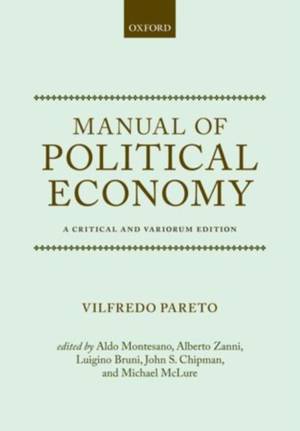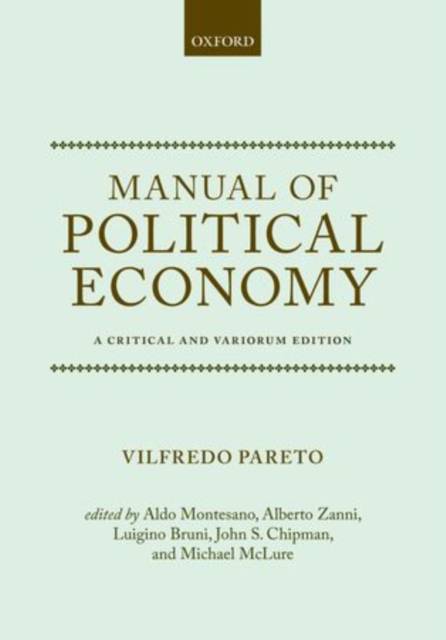
- Afhalen na 1 uur in een winkel met voorraad
- Gratis thuislevering in België vanaf € 30
- Ruim aanbod met 7 miljoen producten
- Afhalen na 1 uur in een winkel met voorraad
- Gratis thuislevering in België vanaf € 30
- Ruim aanbod met 7 miljoen producten
Zoeken
€ 410,95
+ 821 punten
Omschrijving
Vilfredo Pareto's Manual of Political Economy is a "classic" study in the history of economic thought for many reasons, the most noteworthy of which include the setting of general equilibrium economics within a choice theoretic framework based on the opposition between tastes and obstacles; the definitive formulation of economic efficiency, including the surplus approach to collective welfare; the technically flawed but nonetheless insightful treatment of path dependence in consumer theory; and the introduction of non-competitive market analysis to the general equilibrium economics. In so doing, Pareto's general study of economic equilibrium not only substantially extended the contributions to economic theory made by Leon Walras, his predecessor in the Chair of Political Economy at the University of Lausanne, it did so in a manner that was often contrary to Walras's own thinking on the formalisation of economic theory.
.
This English language "critical edition" of Pareto's Manual of Political Economy - a revised and extended translation of the 'Edizione critica' published in Italian in 2006 - is a very significant book for two main reasons. First, it is the only variorum translation of the Italian language Manuale di Economia Politica, originally published in 1906, and the subsequent French language Manuel d'Economie Politique, originally published in 1909. Second, it includes extensive contributions from the editors including annotations, to clarify particular points in Pareto's text; editors' notes, to critically reflect on major themes in Pareto's text and to draw attention to the historical influences that led to their development and their anticipation of, or influence on, subsequent ideas that emerged in economics; and notes to the 1909 mathematical appendix, to highlight the mix of insight and imperfection in Pareto's mathematical economics.
.
This English language "critical edition" of Pareto's Manual of Political Economy - a revised and extended translation of the 'Edizione critica' published in Italian in 2006 - is a very significant book for two main reasons. First, it is the only variorum translation of the Italian language Manuale di Economia Politica, originally published in 1906, and the subsequent French language Manuel d'Economie Politique, originally published in 1909. Second, it includes extensive contributions from the editors including annotations, to clarify particular points in Pareto's text; editors' notes, to critically reflect on major themes in Pareto's text and to draw attention to the historical influences that led to their development and their anticipation of, or influence on, subsequent ideas that emerged in economics; and notes to the 1909 mathematical appendix, to highlight the mix of insight and imperfection in Pareto's mathematical economics.
Specificaties
Betrokkenen
- Auteur(s):
- Uitgeverij:
Inhoud
- Aantal bladzijden:
- 708
- Taal:
- Engels
Eigenschappen
- Productcode (EAN):
- 9780199607952
- Verschijningsdatum:
- 3/06/2014
- Uitvoering:
- Hardcover
- Formaat:
- Ongenaaid / garenloos gebonden
- Afmetingen:
- 175 mm x 249 mm
- Gewicht:
- 1383 g

Alleen bij Standaard Boekhandel
+ 821 punten op je klantenkaart van Standaard Boekhandel
Beoordelingen
We publiceren alleen reviews die voldoen aan de voorwaarden voor reviews. Bekijk onze voorwaarden voor reviews.








